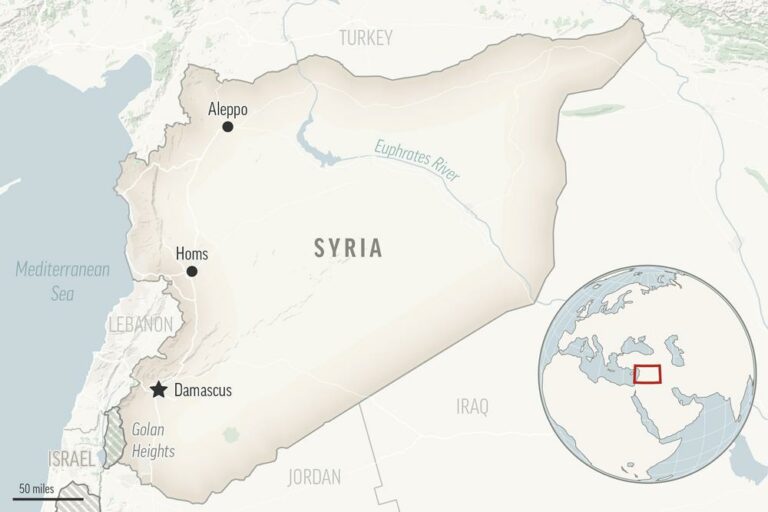Satellite imagery showed widespread destruction at a giant military facility in western Syria targeted in a recent Israeli airstrike, and the head of a Syrian opposition war monitor said Sunday the strike targeted a depot housing over 1,000 middle-range missiles for Iran-backed fighters.
Syrian state media reported after the Thursday night attack near the cities of Tartus and Hama that two people were wounded and fires were sparked in nearby forests. It added that the missiles were fired from over the Mediterranean and most of them were shot down.
Syrian opposition activists at the time said the strike targeted an arms depot and a scientific research center near the central town of Masyaf, a government stronghold. Masyaf is almost halfway between the coastal city of Tartus and the central city of Hama.
Aurora Intel tweeted that initial analysis of satellite imagery showed that some buildings and areas sustained heavy damage from the reported airstrikes. It added that areas around the Scientific Studies and Research Center sustained “heavy fire damage due to the secondary explosions.”
Img. Courtesy of @planet shows the damaged caused, some buildings appear to be completely destroyed, suspected to be the main targets and others potential from the secondary explosion(s)/fire(s), one also appeared to be under construction https://t.co/GJeY1NfJH8 pic.twitter.com/h5psOwbHOg
— Aurora Intel (@AuroraIntel) August 26, 2022
The imagery showed that part of the green areas surrounding the facility had been burned.
Rami Abdurrahman, who heads the Britain-based opposition war monitor known as the Syrian Observatory for Human Rights, said the Israelis struck several positions but the main target hit was a giant arms depot housing about 1,000 precision-guided middle-range missiles. He said the explosions at the facility lasted for more than five hours after the strike.
According to a Ynet report over the weekend, Israel was able to cause such extensive damage due to the fact that Russia recently relocated its S-300 air defense system away from Masya to use in its “special military operation” in Ukraine, clearing the way for the Israeli strike.
Russia’s removal of the air defense system from Masyaf was a golden opportunity for Israel as the city has become the primary location the production of Syrian and Iranian precision missiles and rockets by Hezbollah and other Shi’ite terror groups.
Abdurrahman added that an underground facility to develop missiles in the area under the supervision of Iran’s paramilitary Revolutionary Guard was not affected by the strikes, probably because it was dug deep in the mountains. He said the strike left one Syrian army captain dead and 14 other Syrians wounded.
“The explosions were among the largest since Israel began carrying out airstrikes in Syria,” he said.
Lt. Gen. Alexus Grynkewich, the top U.S. Air Force officer in the Middle East, said he was “certainly aware” of reports that Israel targeted an arms depot in Syria in recent days but stressed there was “no connection” between that attack and the U.S. airstrikes that hit Iran-linked targets in Syria last week.
He said that the recent actions that the U.S. military took “are entirely disconnected from any other actors, whether the Israelis or anyone else.”
On the tit-for-tat attacks that raised tensions between the U.S. and Iran-backed militias in Syria last week, Grynkewich said he hoped “things have de-escalated and now we’ve reached a point where deterrence is once again established.”
(YWN Israel Desk – Jerusalem & AP)











